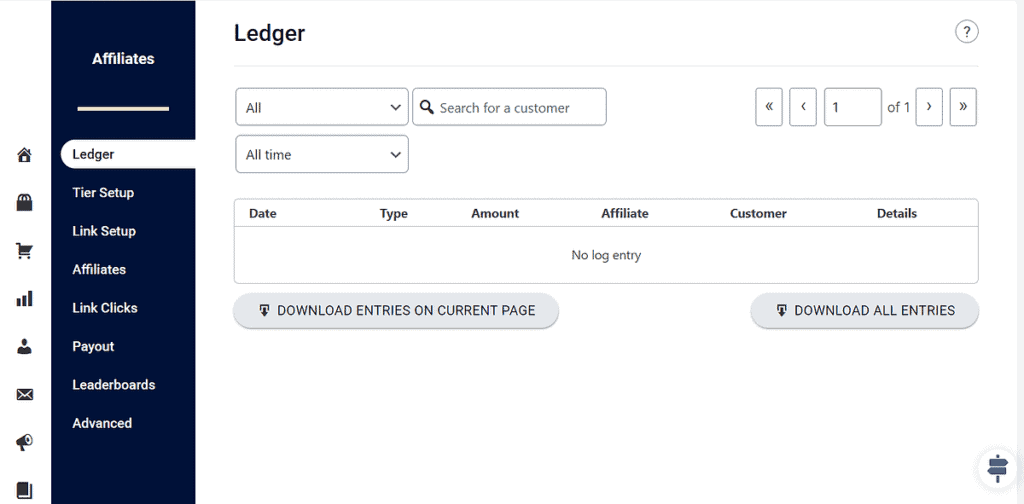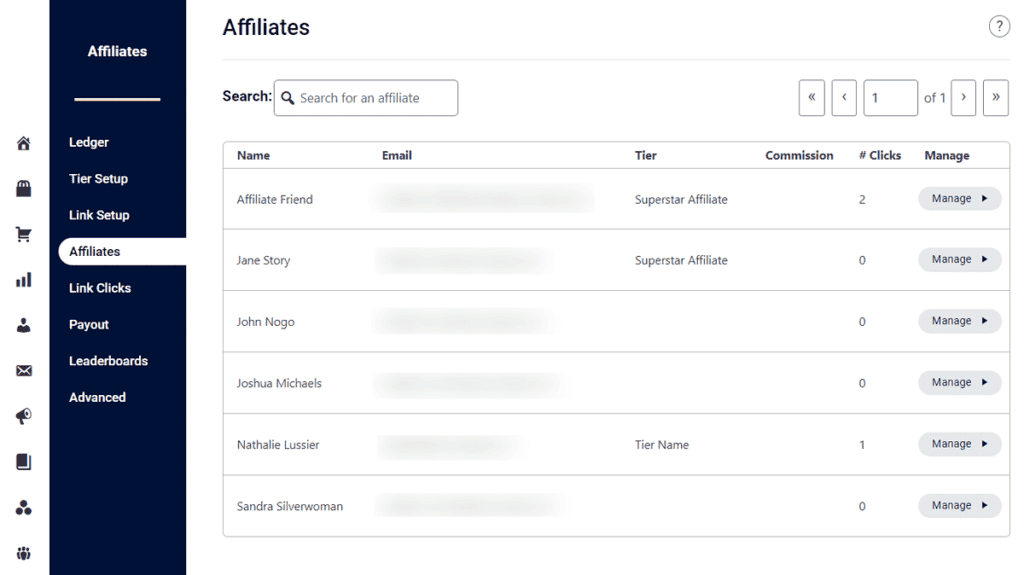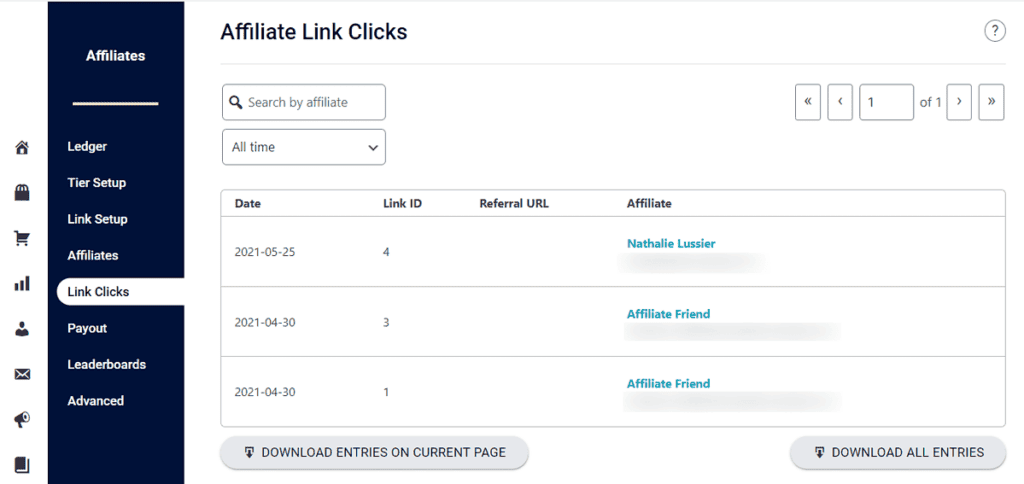What would you say is the best way to promote online courses?
Ads? Referrals? Social media? Word-of-mouth publicity?
Nope. The answer is affiliate marketing.
Think about it.
There are hundreds of thousands of ads, emails, blogs, and social posts being published every day. If your course offerings have to stand out in this clutter, starting your marketing efforts from scratch is not enough.
Affiliate marketing can help you leverage the popularity of established marketers in the industry, making it easier to get a foot in the door and generate sales.
In this article, we will explore how you can set up an affiliate program for your online business and how to manage it.
What is an online course affiliate marketing program?
Affiliate marketing is when you partner with someone, a.k.a. your affiliate, to promote your courses on their own media platforms and increase course sales.
In return, you pay the affiliate a flat fee or commission per sale. These promotions can also be for a sale you may have or a marketing campaign you may be running.
Let’s be clear though. Affiliate marketing is NOT the same as,
- Referral marketing or
- Influencer marketing
There is some natural overlap between the three, but there are some key differences as well.
Let’s begin with influencer marketing, as this is the most distinct of the three. Influencer marketing is when you give your product for free to an influencer, in exchange for them promoting it to their audience. In most cases, a free course is not enough though, and you’ll also need to pay them a promotional fee upfront. That’s because they have a lot of people competing for their sponsored content spots.
People more often confuse affiliate marketing and referral marketing with one another. Let’s take a look at some of the ways in which they differ:
| Affiliate marketing | Referral marketing |
| Affiliates promote your product/service through their own platforms, like a website, blog, email subscriber list, etc. Affiliate marketers have hundreds of visitors to their platforms and so do not have personalized messaging. Good for beginner course creators with new websites looking to expand their customer base. | Referrals work on a word-of-mouth publicity principle, rewarding current customers who invite their friends/family to try the product or service. Referrers have a small but niche audience, and can tailor their messaging to their audience. Good for websites with an existing, loyal customer base. |
Let’s understand this better with an example.
Scenario A:
A blogger signs up on Amazon and starts promoting all of Amazon’s products and services on their self-owned website through ads.
Amazon gives them a dedicated code and offers a percentage commission per sale. They may use the code in any email campaigns or social media activities they conduct to promote Amazon’s products.
The blogger is expected to keep producing original content and meet a pre-decided sales quota to maintain the ability to host these ads.
Scenario B:
A blogger discovers a great product on Amazon and recommends it to their readers through one of their blogs.
The product starts getting a lot of traction, so the blogger reaches out to Amazon and signs up to promote that particular product through personalized recommendations.
Amazon offers the blogger’s followers a special discount for buying through the blogger’s page, and the blogger gets a commission per sale.
They may or may not choose to update the page from time to time.
If you refer to our table above, you’ll quickly be able to surmise that Scenario A is an affiliate marketing program while Scenario B is a referral program.
Both strategies are helping generate revenue, but the underlying philosophy is very different.
So, the next question is, which one is better? Affiliate marketing or referral marketing?
Well, it depends. If you are a new online course creator and want to reach out to as many new customers as possible, affiliate marketing is the way to go.
If you are a seasoned course creator with a large and loyal student base, referrals may help you out more.
Having said that, we recommend setting up an affiliate program in either case, as it creates a steady stream of passive revenue. Here’s how.
Why should you set up an affiliate program for your online course?
Setting up an affiliate program for your online course has several advantages.
You get access to new audiences, the return on investment is pretty high, and the cost of advertising comes from the affiliate’s pocket.
Let’s take a look at these and other benefits of affiliate marketing in more detail.
Better customer reach
Affiliate marketers can introduce your course to new audiences, and hence drive more conversions. This can be great if you are a beginner or have a niche course.
Seasoned affiliates can come up with creative ways to promote your courses, making use of ongoing trends and their own original content.
Increase in traffic
A strong affiliate program can drive a high volume of relevant traffic to your website, improving conversions.
Affiliates can promote your course on their platform through a variety of methods.
They may run banner ads, text ads, post links on their websites, or send emails to their subscribers. The traffic from all these channels can add up to a substantial amount of visitors to your website.
Improved sales
Contrary to popular opinion, more traffic does not always mean more sales.
However, in this case, because your traffic is coming from relevant and reliable sources, affiliate marketing does result in improved sales.
In fact, according to Business Insider, 15% of sales revenue can be attributed to affiliate marketing.
Besides, as affiliate marketing is performance-based, your affiliates are incentivized to sell more. Your course gets exposure to more target audiences than just those who actively search for it.
This can help increase your overall sales, which in turn helps you grow your business faster than if you were relying only on direct sales.
Better brand awareness and trust
Most affiliate marketers are authority figures in their domains.
Their opinions carry weight and people trust their work.
When your brand is recommended by these thought leaders, visitors are more likely to trust your website, leading to better brand awareness.
The good part is, having a steady stream of visitors with high expectations also keeps you motivated to produce great courses.
Low customer acquisition costs (CAC)
Compared to other forms of digital marketing, affiliate marketing has extremely low customer acquisition costs.
Having a pay-for-performance model enables you to pay the affiliate only when a sale is made. All advertising and promotional costs are borne by the affiliate.
In many cases, this is more cost-effective than paid advertisements, SEO, or cost-per-action marketing and gives you more opportunity to budget for other areas of business growth and development.
Faster returns
84% of businesses rate affiliate marketing ROI as better than other marketing channels. And there’s a reason for that.
Digital marketing activities require a substantial investment of time, money, and effort if they are to work.
With affiliate marketing, you are effectively outsourcing your sales efforts to loyal partners, which can significantly reduce the time and cost you invest in your own marketing activities.
Easy result tracking
Every affiliate marketer has a unique affiliate code, which they have to add to their URL to get the credit for the sale.
This makes it easy to set up and track sales funnels, ensuring that your affiliate gets duly compensated for their efforts.
It also helps you know which affiliate partnerships are working and which are not, so you can offer more incentives to the affiliates bringing in more revenue.
You stay in control
Affiliate programs allow you, the course owner, to stay in control at all times.
You can set up strict rules and regulations as to who can be an affiliate, what kind of content they can post, and how the payout system works.
This ensures that all your affiliates understand your brand values and are in sync with your expectations.
Now, although all of these benefits sound great, you need to understand that you can enjoy them only if you choose the right affiliates to promote your products.
There are many unscrupulous affiliates who use black hat techniques to get commissions for redirects. Here are some ways to identify a good affiliate partner and some red flags to avoid.
How do you find the right affiliates to represent your online course?
Good affiliates are an asset. They can be your trusted sales partners and help improve brand reach and revenue.
Bad affiliates are a drain on your resources and can end up damaging your brand reputation.
Here are some characteristics of great affiliates, who can help maximize the returns from your affiliate program:
- They have a large, loyal following and people who trust what they say.
- They often have the same target audience as your brand.
- Their brand aligns with your brand and its values.
- They have personally used your courses and have had a great experience, meaning they understand the value and appeal of your online courses.
- They have the expertise and the inclination to communicate the benefits of your course positively and effectively.
- They have in-depth insights into your industry.
- They conscientiously follow the best practices and white hat techniques for affiliate marketing.
So, what are the pitfalls to avoid in an affiliate?
Be aware of affiliate marketing fraud
Affiliate marketing fraud is when unethical influencers offer fake coupons on their sites which misrepresent your courses.
They may squat on domain names, populate online registration forms with false information, or purchase ads for your high-ranking keywords to drive search engine traffic their way.
They may even sign up for your affiliate program only to get access to your courses at a discounted rate.
Avoid affiliate networks
Affiliate networks are platforms that connect affiliate marketers with various brands. This might seem like a good strategy for beginners, but it has several drawbacks.
- You have to pay network fees, which means the network takes a cut every time your affiliate makes a sale. In these cases, you spend more and affiliates earn less than what they deserve, reducing their motivation to sell.
- Affiliate networks endorse many brands, even the ones that may be your direct competitors. The best affiliates in the network are likely to focus on brands that offer them a better commission, which may put your program on the back foot or reduce your chances of getting the best affiliates.
- All affiliate performance data is controlled by the affiliate network, which does not give you insights into how well the affiliate is doing. This lack of transparency can make it difficult to calculate your exact ROI and identify the right ways to incentivize affiliates.
An affiliate marketing program works best when you set it up on your own, have clear terms and conditions about how it operates, and monitor affiliate performance.
For many eLearning websites, this is easier said than done. So, here is a detailed guide on how you can start an affiliate program for your online courses.
What tools do I need to start an affiliate program for my online course?
Setting up an affiliate program for your online course typically needs a three-pronged approach:
- Get affiliates
- Set affiliate commissions
- Create an airtight affiliate agreement
Many platforms can help you create and sell online courses.
However, most of these sites do not have an integrated affiliate program module, which requires you to set up and manage affiliate programs separately – for example, with a WordPress affiliate plugin.
The result? A heavier, more complicated website, resulting in integration issues and complicated payment processes.
A better alternative is to opt for an all-in-one solution that can provide all the features you would normally need to set up, run, and market your online course.
That is where AccessAlly comes in. AccessAlly is a powerful plugin that has a built-in suite of all the features you need to create and sell eLearning courses.
With AccessAlly, eLearning entrepreneurs can easily manage their affiliate marketing alongside payments, memberships, course structure, a member directory, and community management.
This allows you to create and manage your courses from a single learning platform.
Build Your Own Teaching Ecosystem, Customized to Reflect Your Teaching Style.
With AccessAlly, you’re creating your own platform to run courses, memberships, and communities on.
 See it in action
See it in actionHow to manage your affiliate program using AccessAlly
AccessAlly is designed to provide every functionality that online coaches need to make it easy for them to scale their businesses and grow.
This includes the affiliate marketing program module, which empowers you to market and sell your online courses, memberships, and events.
A tight-knit integration with all other modules makes it easy for you to manage and run your affiliate marketing strategy.
Here is a brief overview of how it works:
Step 1: Create your course and membership program
To start your education affiliate program, you need to first have a product or a service.
This can be either a course, a membership, or an event that you want to promote.
AccessAlly has a powerful course creation and management module which you can use to design and build your course. It also features a flexible membership module that offers easy, tag-based control and supports multi-level memberships.
You can also create one-time or recurring events like webinars, conferences, and so on, which can be great crowd-pullers.
Once you have your product, it is time to build your affiliate program.
Step 2: Build your affiliate program
You can start building your affiliate program with AccessAlly’s affiliate management feature, which enables you to track referral traffic and product sales.
To navigate to the Affiliate module, go to your WordPress backend.
Navigate to AccessAlly > Affiliates

Here you can set up various affiliate tiers and commission rates to classify your affiliate marketers.
For more information on what the various affiliate tiers look like, you can watch this dedicated video:
The next step is to set up the link destinations, where readers will be directed once they click on affiliate links. To manage these, go to the Link Setup tab.
You can assign landing page link destinations for every type of affiliate link.
Now your site is ready to start onboarding affiliates.
Step 3: Get affiliates to sign up on your website
Start reaching out to affiliate marketers in your niche and invite them to sign up for your education affiliate program.
You can view and manage all sign-ups from the Affiliates tab in your Dashboard. Each affiliate is assigned a unique referral code to identify their sales contribution.

This gives you a bird’s eye view of the affiliate level, the number of clicks attributed to them, their contact information, and their commission rate.
When an affiliate signs up for your program, they can begin using referral links that are unique to them in their online content, such as social media posts, blog articles, video content, email marketing, and more.
Step 4: Track affiliate sales with the last-click principle
AccessAlly makes it easy to track affiliate performance with a last-click principle. The sale is attributed to the last URL before the visitor moves to the checkout page.
For example, if an affiliate is promoting a particular course, this is how the last click system would work:
- The affiliate adds their referral code to their page promoting the course.
- A visitor sees the course on the affiliate’s website and clicks the link therein, which takes them to your course page.
- The visitor signs up for your course and completes the purchase
- The sale is attributed to the affiliate
Here’s how AccessAlly tracks the last clicks attributed to each affiliate:

AccessAlly’s software lets you see when a user clicks on an affiliate link, when they sign up for your course, membership, or coaching program, and which affiliate source they came through.
This allows you to see which affiliates and what type of content works best for promoting your course.
You can even use AccessAlly to make affiliate tracking even more effective with features like affiliate leaderboards.
You can create useful affiliate dashboards for your affiliates, where they can see all of their stats and links, and participate in affiliate leaderboard contests.
Step 5: Calculate affiliate commissions
Based on this last-click data and the commission structure for the membership tier, you can calculate the commission earned by each affiliate and accordingly pay them for their efforts.
The commission calculator calculates the affiliate payout amount as follows:
Affiliate Payout Amount = Total commissions – Clawbacks – Previous payouts
A good idea is to pay affiliates after the refund window for your courses has closed.
For example, if you have a 15-day refund policy for your courses, memberships, or events, attribute the sale and calculate the affiliate commission on the 20th day.
AccessAlly integrates with PayPal to facilitate smoother payment processing. If necessary, you can also pay commissions manually.
Step 6: Track affiliate performance and develop incentive programs
Managing your affiliate program does not end here.
With AccessAlly, you can track the performance of your affiliate marketers and see where there is scope for improvement.
It can also help you diversify your affiliate partners and offer exclusive discounts to high-performing affiliates.
At the end of the day, affiliate programs thrive when they are mutually profitable.
Start an affiliate program for your online course with AccessAlly

8 out of 10 brands run an affiliate program today.
Affiliate marketing generates more than 15% of revenue from digital marketing channels, equivalent to more personalized strategies such as email marketing and social media marketing.
The eLearning industry is worth more than USD 315 billion today, which means there is a lot of opportunity for growth here.
It also means that competition is high and traditional marketing is no longer enough.
A well-designed and effectively implemented affiliate marketing program for your online courses can help your website get relevant traffic, leads, and sales, boosting overall growth.
“While the online learning industry is growing at a rapid pace, it is now key to stay up to date with the latest developments. Entrepreneurs can dig into mastermind, coaching, and consummation programs to scale themselves rapidly. This is an incredible opportunity for those who go the extra mile,”
Javid Niazi-Hoffmann, Coaching Consultant from Germany, on Forbes.com, 2020
AccessAlly is the best solution to set up your own course affiliate program, as it offers integrated tools for adding, managing, and paying affiliates on the same platform.
Skip the hassle of using six different tools for your eLearning website with one simple, more powerful system.
Get the AccessAlly advantage today.




